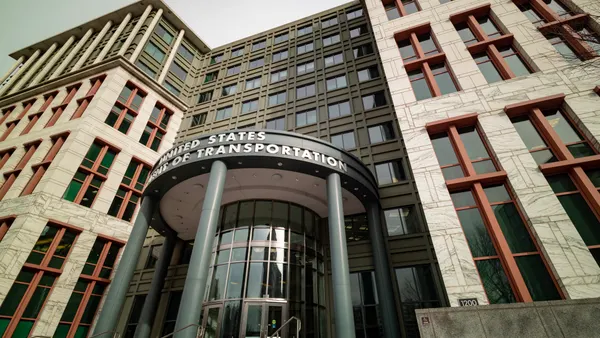UPDATE: May 13, 2020: The FMCSA has extended its COVID-19 emergency declaration, which grants some HOS exemptions, through June 14, the agency said Wednesday.
This is the second extension the FMCSA has issued, slating an original end date of April 12, then pushing it to May 15. The list of items that qualify the driver for the HOS exemptions has not changed since it was last expanded April 8.
Dive Brief:
- The FMCSA has extended its COVID-19 emergency declaration, which grants HOS exemptions, through May 15, the agency said Wednesday. The original declaration had an end date of April 12.
- The latest declaration also adds "liquefied gases to be used in refrigeration or cooling systems" to the list of items that qualify the driver for the HOS exemptions, if the driver is transporting them in an operation directly related to COVID-19 relief efforts.
- Guidance from the FMCSA accompanies exemptions and permits given by state DOTs for HOS and weight restrictions.
Dive Insight:
The FMCSA action is a sign from the U.S. DOT that emergency relief action is needed even as the nation's COVID-19 cases could soon peak and then decline. A U.S. peak in COVID-19 deaths could occur as early as Saturday, according to the Institute of Health Metrics and Evaluation.
The HOS exemption under the declaration does not cover routine commercial deliveries. It seeks to keep the flow of medical supplies, food, cleaning supplies, paper, various precursor materials such as plastic and alcohol, and more. It also mandates a 10-hour break when a driver is moving from emergency relief efforts to normal operations.
The White House has not announced recommendations on when to ease up on guidelines that have closed schools, restaurants, movie theaters and forced many to work from home. President Donald Trump tweeted his support in favor of a national commission to decide when and how to restart the economy, getting it back to normal speed.
The need for relaxed rules won't likely extend into early summer. Fleets are reporting smaller load volumes as consumers refrain from panic buying, according to Commercial Carrier Journal.
Spot rates are also declining, according to Peggy Dorf, a senior analyst for DAT. "Carriers had enjoyed sky-high demand through late March, as consumers cleared store shelves of cleaning supplies, paper goods, and non-perishable food products. That demand continues, but it is offset by widespread closures of manufacturing and distribution operations for goods that are deemed non-essential during the COVID-19 crisis," Dorf wrote in a Monday blog post.










